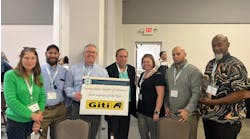California was a hotbed of activity for tire industry-related issues last year. And Terry Leveille, president of TL & Associates and publisher of the California Tire Report, covered it all.
With 2009 still fresh in our memories, here is Leveille's "Top 10" list of California tire stories in 2009.
1.The California Integrated Waste Management Board (CIWMB) is eliminated. As a result, the $40 million tire program is shifted to a new department.
"Bowing to the demand by Governor Arnold Schwarzenegger that he would not sign a budget bill unless the state legislature abolished the CIWMB, and ignoring the argument that removing the board would not save a penny of general fund money, the state legislature ended the board's 20-year run as the most important recycling and waste reduction agency in California."
On Jan. 1, 2010, the CIWMB and the state's Beverage Container Recycling Program merged to form the Department of Resources, Recycling and Recovery (DRRR).
"To pour a little salt in the wound, the state legislature agreed to an 18-month delay in paying back $17 million it borrowed from the 'Tire Fund' in 2003; and it borrowed another $10 million for good measure. The state constitution requires that all funds borrowed must be paid back with interest, but it doesn’t designate a timeframe."
2. Grants for asphalt rubber programs and tire-derived products (TDPs) are canceled in fiscal year 2009/10.
Four tire product grant programs that provided awards to local jurisdictions were canceled this year because they have become so popular, according to Leveille. All four grant programs were "oversubscribed" by more than $10 million in 2009.
"While the four grant programs were canceled year, it is expected that the process for... 2010/11 grants will begin early, and that the DRRR will provisionally approve qualified grantees this coming spring."
3. Two tire aging bills are defeated.
Both bills required tire dealers to disclose the date a new tire was manufactured and warn customers about tires more than six years old.
AB 323 would have required tire dealers to disclose the date of manufacture of every tire sold and require tire dealers and automotive repair dealers -- including auto body repair shops -- to display the following sign advising customers about tire aging:
“WARNING! Tires degrade over time even if not used. Tires older than six years can cause sudden tire failure. IF YOU HAVE A COMPLAINT, CALL THE DEPARTMENT OF CONSUMER AFFAIRS AT 1-800-952-5210.”
"With the opposition admitting that tires age even if they are not on a vehicle, but claiming that there is no research showing that tires become unsafe after six years, AB 323 failed passage in the Assembly Business and Professions Committee.
AB 496 would have required a tire dealer to disclose to a customer the date of manufacture of a new or used tire, and issue a statement warning them to replace tires that are more than six years old. An amendment to the bill exempted new car dealers from its provisions.
"Although AB 496 made it through the assembly... the bill fostered opposition by tire dealers, the Tire Industry Association, the Rubber Manufacturers Association, and others," says Leveille.
"Aside from the claim that there is no evidence that tires are dangerous after six years, the opponents also argued that the bill would allow trial lawyers to claim that tire aging was a presumable cause for tire failure, regardless of cause, and that exempting new car dealers from informing their customers was unfair and inconsistent with the intent of the bill."
AB 496 was withdrawn by its author, Assemblyman Mike Davis (D-Calif./48th district). "The bill may be reintroduced in 2010."
4. Baja California waste tire programs and clean-ups get a boost.
With the assistance of United States Environmental Protection Agency, the RMA and the CIWMB, efforts are being made to help Baja California develop a scrap tire management program and remove the millions of illegally dumped waste tires south of the California border.
5. Studies on crumb rubber infill for synthetic turf continue to vindicate industry.
Since 2007, when the advocacy group Environment and Human Health Inc. of New Haven raised concerns about children inhaling potentially toxic emissions from the crumb rubber infill of synthetic turf fields, the synthetic turf industry has been pointing to studies involving the the New York City Department of Health and Mental Hygiene, the RMA, Milone & MacBroom Inc., the Connecticut Department of Public Health, the Office of Environmental Health Hazard Assessment and the California Department of Public Health, all showing that no harmful levels of emissions are off-gassed from the rubber.
"California crumb rubber producers have a stake in the outcome of this debate because Moreno Valley-based B.A.S. Recycling and CRM Co. -- which produces cryogenic crumb rubber its plants in Arizona and New York -- both sell their product to the world’s largest synthetic field installer, FieldTurf.
"FieldTurf requires that the crumb rubber infill be made using a cryogenic technology. Other synthetic turf manufacturers and installers allow for ambient grind crumb."
6. Three California agencies adopt regulations affecting tire dealers/recyclers.
* California Air Resources Board (ARB): “Adoption of the Proposed Regulation to Reduce Greenhouse Gas Emissions from Vehicles Operating with Under-Inflated Tires.”
The regulation will require all automotive service providers (tire dealers, smog check stations, lube and oil stations, etc.) to perform a tire pressure service (check and inflate) when maintenance or repair services are performed.
"Originally, there was a question as to whether the providers had to check and inflate spare tires, but the ARB has determined that this would be done only at a customer’s request." The regulation becomes effective July 1, 2010.
* California Energy Commission (CEC): "Fuel Efficient Tire Program."
State law requires the adoption of a fuel-efficiency rating system for replacement tires to enable consumers to make "more informed buying decisions." The CEC proposal requires tire manufacturers to use an accredited facility for testing replacement tires they plan to sell in California by July 1, 2011.
"There are no mandates on tire dealers, although a software database of 'fuel efficient' tires will be made available."
The proposed regulations are awaiting approval by the Commission.
* Office of the State Fire Marshal: "Tire Rebuilding and Tire Storage."
The California State Fire Marshal is recommending that the Building Standards Commission adopt some revisions that will affect the outdoor storage standards for waste tire facilities.
Key among the proposed standards is a requirement that outdoor "tire storage piles shall be located at least 50 feet from lot lines and buildings." This is interpreted as meaning the storage of new, used, or waste whole or shredded tires; tire feedstock, such as crumb rubber; or manufactured tire-derived product.
This standard exists now, but it is only a guideline. The former CIWMB had held to a 10-foot distance between tire storage and lot lines, with local fire authority approval; that may change if these amendments are adopted.
The Office of the State Fire Marshal has circulated these new amendments twice for public comment, and plans to hold a hearing on them at 10 a.m. on Jan. 12, 2010.
7. Five-Year Plan for the Waste Tire Recycling Management Program is adopted by CIWMB.
In May, the CIWMB adopted its legislatively-mandated Five-Year Plan that outlines tire programs and funding levels for those programs. The expectation is that about $40 million annually will be spent over the next five years.
The stated goals of the plan include the following:
* increase the annual scrap tire diversion rate to 90% by 2015;
* conduct inspections according to statutory requirements and ensure that 100% of facilities are in compliance or under compliance orders by 2009;
* eliminate all identified illegal tire piles by 2010; and
* reduce the number of tires generated by Californians from the current 1.1 to 0.75 per person, per year by 2015.
8. RMDZ awards loan to Tri-C Manufacturing; the Tire Equipment Loan Program approves loans to Golden By-Products and Bulldog Recycling.
In April, Tri-C of West Sacramento was awarded a low-interest (4%), $1.5 million loan under the Recycling Market Development Zone (RMDZ) program to “purchase equipment and build leasehold improvements for the expansion of their recently started tire recycling operation.”
In September, the CIWMB approved a $1 million loan (at 4% interest) to Golden By-Products (dba Scrap Tire Co.) of Ballico under the Tire Equipment Loan Program.
"Golden plans to expand its tire processing operations and divert an additional 7,500 tons -- approximately 750,000 tires -- per year of waste tires."
The CIWMB also approved a $2 million loan (at 4% interest) to Bulldog Marketing LLC (dba Bulldog Rubber & Recycling) under the Tire Equipment Loan Program.
The new company, located in the north San Diego County community of Vista, requested a loan to help finance the purchase of equipment for processing whole tires into crumb rubber. The firm’s initial plans call for employing 19 and diverting 13,000 tons of waste tires annually.
9. A proposal emerges to exempt tire-derived products (TDPs) from some storage requirements.
In April, the CIWMB held its first meeting to exempt some TDPs from being counted as passenger tire equivalents (PTEs) waste tire facility permits.
"Since financial assurance mechanisms, such as bonds, are based on the maximum number of tires, or PTEs, stored at a facility, a change in the regulation could spell financial relief for processors of tire feedstock or manufacturers of products," says Leveille. "The overall goal would be to facilitate the development of California TDP markets."
A key issue involves how modifying the storage requirements would impact fire safety. Current regulations allow a local fire agency to approve an alternate fire safety program at a site “if it finds it to be sufficiently protective.” However, at the time, CIWMB staff felt that, on occasion, local fire authorities might have more relaxed standards than is acceptable.
A multi-step process for dealing with this issue was recommended, which is where the issue stands.
10. Tire Business Assistance Grant Program provides $2.8 million to tire recyclers.
The only direct grant program available to private sector tire processors and TDP manufacturers in California is the Tire Business Assistance Grant Program, or TBAP, which is “designed to increase diversion of tires from California landfills by increasing demand for tire-derived products.”
In August, the CIWMB approved grants for 23 companies totaling more than $2.8 million, broken down as follows: $861,000 for "general assistance," $429,000 for "technical assistance," $970,449 for "marketing assistance" and $580,000 for "testing."


